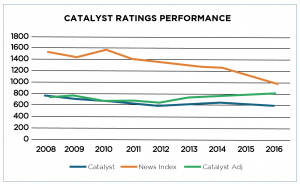Whether you liked Catalyst or not, the reasons being given for its demise don’t add up
Whether you liked Catalyst or not, the reasons being given for its demise don’t add up and that may end up reflecting poorly on the ABC
ABC management axed its long-running, magazine-style science program Catalyst this month, saying the show wasn’t meeting the changing needs of its market or audiences and citing recent journalistic failures that had led to brand damage. The latter was said not to be a major reason, however.
Management also stated that with the change it would be moving the science TV format to “world’s best-practice for science programming” and used as an example the BBC show Horizon.
Horizon is a multi-award winning, one-hour science program with a production budget not far short of your average Steven Spielberg movie. The ABC is not the BBC. Saying you are going to do 17 hours of Horizon-like TV shows on the ABC is, well, ambitious to say the least. But this was the ABC’s management line.
Apart from the BBC thing, it sounded like ABC management must have done some solid homework to make such a change. Literally thousands of commenters took to blogs and forums (the Guardian’s website had more than 1000 comments on the topic), to defend the show, most of its reporters and the format.
I’m going to admit something here, I’ve mostly found Catalyst boring (apologies to most of their journalists, who seem actually pretty good). If it were up to me, I would have got rid of it years ago. So when I heard it had been axed, I guessed most people were thinking what I thought: finally it crossed that line in TV where the ratings must have got too low to justify the production cost.
It happens to the best of household-name shows. I could hardly believe it when Burke’s Backyard went under. What about Hey Hey It’s Saturday? Both shows weren’t that bad ratings wise, but they had slowly declined, and as cost pressures hit their commercial station owners, the issue became the slots could be replaced with similar-rating shows that cost a lot less to make.
This is what I guessed must have happened to Catalyst, but given the politics around the ABC – both around industrial relations and its implied responsibility to promote greater engagement with the general public on science – there was obviously a little spin required in announcing the show’s demise. That, and the opportunity which, in part, presented itself when the second finding on Maryanne Demasi’s WiFried story came out as poorly as the investigation into her statins story. The timing must have been tempting.
The key ABC manager in charge of this potentially embarrassing situation, Richard Finlayson, tried to point out that TV audiences were changing their habits. But this argument, used a lot in recent times by an energetic and powerful fraternity of global online companies such as Google and Facebook, has come in for quite a bit of criticism.
Online platforms are not taking TV audiences hand-over-fist as Facebook wanted us to believe a year ago. Media buyers are up in arms at how overhyping this argument has actually led to massively overestimated online video audience numbers, in the case of Facebook, by up to 80%. What should have brought some clarity to this event is the actual ratings performance of Catalyst. Nothing like the cold, hard numbers to sober the frothing masses. But this information wasn’t being quoted anywhere.
I tried to get media ratings company OzTAM to help me here, but they wanted me to pay the company about $1500 for a few keystrokes to extract that information, so no love for science, community or journalism there. Instead, I ended up tediously sifting through eight years of top 20 to top 50 nightly ratings of Australian TV shows data on a strange, long-running TV website I found called TV Tonight, and came up with the chart below.
I couldn’t get all the data points so there is room for error here. But I think I got enough of them, and sorted it well enough, to tell an interesting story.
In short, the performance of Catalyst over the last eight years of its 15-year life has been nothing short of amazing. It’s doing better today than it did eight years ago, in relative terms. So much for suggestions that audiences were moving to other media as habits changed.
The green line on the chart is an adjusted audience measure for the last eight years of the show. It’s adjusted because TV has been naturally declining over the years as we have shifted our screen habits to more online consumption, to cable television, to streaming services and to appointment viewing.
The grey line is the raw performance of Catalyst. It’s actually pretty good, even though it shows some decline.
The red line is the raw, averaged performance of the two major commercial news channels. The adjustment is a weighted relative performance of Catalyst, as if TV viewing hadn’t shifted to all those other things, based on the decline of the two news programs, which I thought was probably the best long-term base line to make such an adjustment. The “y” axis is net numbers of viewers per week night for the five metro regions, in thousands.
What about the claim that the ABC was moving to world’s best practice in emulating Horizon from the BBC?
Horizon has a net audience per show these days of about 2.1 million, which presumably includes some global audience. Adjusted for “viewing shifts”, Catalyst has about 780,000 viewers. Unadjusted, it still has close to 600,000. If you weight that for the TV population of Australia versus The United Kingdom, then you get the surprising finding that Catalyst performs almost exactly as well as Horizon does, and sometimes a bit better.
So, potentially, there goes the “world’s best science programming practice” argument.
Horizon started production in 1964, and has run continually since, so it’s brand building with British audiences has gone on for 52 years, which gives it a pretty big edge over Catalyst.
No one is saying that Catalyst is spectacularly popular. It is a science show after all. But it has pretty much managed to stay in the Top 20 programs on its night slot for the last eight years. In fact, on average it has moved slightly up the top 20 ladder in that time, in a range that has shifted between 11th to 18th, but generally hovers around 15th most-popular show. I’m not a TV executive, but for a weekly science program that seems to be a consistent and high performance.
And another thing. Of all the top 20 to 50 programs per night I sorted through in that eight years, and there were many hundreds, Catalyst is in a very elite club of only seven or so programs that have been going that long. Four of the others were the nightly news. Another one, is another in-house ABC production, Compass.
Although there doesn’t appear to be a formal mandate for the ABC to educate the public on science and encourage the young into science careers, given the long history of science programming on the broadcaster, and a long running desire by federal governments to promote home-grown innovation and STEM education levels, you’d think that this decision by the ABC would be the subject of just a little more scrutiny.
So while I don’t love Catalyst, a lot of people clearly do. If a commercial TV channel had a show that had performed like this for so long, it would be hard to see them ditching it.
The whole thing now looks quite odd. Why would you risk changing to a new format that very probably will not be able to emulate the BBC for the very simple reason that the money isn’t there, nor is the mandate to do global topics, as there is for the Horizon program?
What might the real reasons the show has been axed? I don’t have a clue. But it isn’t that the show is failing to engage Australian audiences in science, nor that the newly proposed format is much better.
It has the feel of a decision based on haste, undeclared agendas and expediency. Maryanne Demasi’s errors, though bad, are more likely due to process and oversight, something that is easily fixed and which seems an acceptable margin of error in a show that has delivered such high engagement over a 15-year period.
Sources in the ABC say that the Catalyst has always had an Achilles heel of not having anyone capable of providing appropriate oversight for a show reporting on science. And that this has held back the show in quality terms and led to the recent reporting disasters that have, in turn, created the brand damage. The sources also claim that the TV managers are trying to get rid of the last in-house produced shows, any which way.
I wonder whether the ABC board got the same argument that the public got? If they did, surely it has a responsibility and should be smart enough to dig a bit deeper. If not, what is going on at the board level that the public isn’t being told about?
The whole thing seems to have a lot more questions than answers at the moment. Certainly, it doesn’t look good for the producers of the show, the management, the board or the ABC brand.
There aren’t many jobs for science and medical journalists in Australia. This show has some good ones and they are all about to lose their jobs, based on what seems to be flawed logic.
It all seems very un-ABC-like to me. Isn’t it also “un-Australian”?



